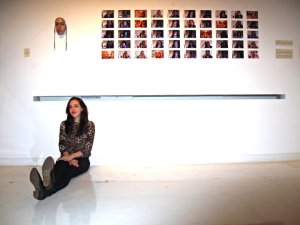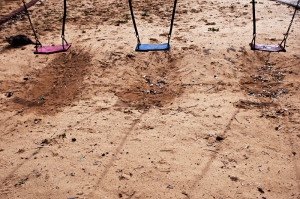By Symi Rom-Rymer
 A chubby young African boy dressed head-to-toe in an Israeli police officer’s uniform looks defiantly into the camera. A teenage girl in a pink room solemnly faces the camera under her hijab. A transvestite clad in a rhinestone studded bra and panties dances with abandon in a Jerusalem night club. These are the faces of another, less visible Israel. Their stories and struggles are often overshadowed by the sexier tales of relentless violence in the Israeli-Palestinian conflict. But for one night, African guest workers and their children, Arab Israelis, members of the transgendered community and other marginalized groups are the center of attention.
A chubby young African boy dressed head-to-toe in an Israeli police officer’s uniform looks defiantly into the camera. A teenage girl in a pink room solemnly faces the camera under her hijab. A transvestite clad in a rhinestone studded bra and panties dances with abandon in a Jerusalem night club. These are the faces of another, less visible Israel. Their stories and struggles are often overshadowed by the sexier tales of relentless violence in the Israeli-Palestinian conflict. But for one night, African guest workers and their children, Arab Israelis, members of the transgendered community and other marginalized groups are the center of attention.
The Envisioning Justice exhibit featuring Israel’s marginalized groups was part of a social justice-themed benefit for the New Israel Fund, a New York-based non-profit organization that focuses on civil society and social justice issues in Israel. The curator of the exhibit, Deborah Plum, is a co-founder of Omanoot, a multimedia arts organization that uses contemporary Israeli art to bring people together. I recently sat down with Deborah to talk with her about Omanoot and the thought-provoking exhibit she put together.
Why start Omanoot? What does it have to offer people today?
Art has become intimidating. Beautiful things have become so challenging for people. Art galleries are competing with YouTube and free music and it’s very hard for people to make time for it. When I went into Omanoot, I really wanted to create this organization that people could use as their outlet, to help people connect to art in an authentic way. We’re trying to be this bridge between the Jewish and Israeli non-profit world /organizational world. We’re not tied to specific political cause, religious organization, medium or theme. We’re trying to bring together new energy [and] speak to people who aren’t as hooked in.
What was your vision for the benefit show?
I really wanted to create a voice for artists who care about social justice issues and who deal with them in their art and personal lives and do so in a very personal way. The goal was not just to show minorities and their subjugation, not just about their sadness, but rather to show the complexity of it. For instance, Gil Lavi [an internationally
renowned photographer] did a series of photos in Sderot. What drew me to those photos was that it was about Sderot. Not about Sderot being bombed or about the State not taking care of the town, but about the place itself. It showed Russian immigrants living there and happy to be there. It wasn’t about the statistics. I loved those photos. I think it was my inspiration for the whole show.
One piece, by Chen Yerushalmi, dealt with the notions of layered identities through masks. Can you talk about why that was important to you to include in the show?
I wanted to come across for women’s rights, not just Arab women’s rights, but all women’s rights. Yerushalmi’s piece was interesting because how much of it was about the masks we wear. The identities we cling to—woman, Israeli–what does that mean beyond the superficial? How does that impact you as a person? In some ways, they minimize the role that these identifiers should play. At the end, it’s just you. In terms of female identity, Israel is such a patriarchal society. Her piece is not negative or positive, but it is such a beautiful expression of those views.
What about the photos of transvestites by Tanya Habjouqa? What did those offer?
I wanted to include those pictures because they [the subjects] were so happy. Here was a club in Jerusalem full of Palestinians and Israelis who were partying together. These were dancing, smiling pictures of coexistence in its purist form. I really pushed for them because I felt that a lot of the photos that I had seen were of ceremonies or parades or vigils for those who had been hurt. I didn’t want to show parades, I just wanted to show life.
Many of the pieces brought up topics that I didn’t know about such as African migrant workers and Darfurian refugees. Do you feel Americans in general don’t know as much about these issues?
 Not just Americans. Some Israelis also are unaware. Israel is always in a situation. It’s always focused on Palestinian-Israeli issues. I wanted to show other issues that probably impact them on a daily basis. Israel needs workers. They’ve closed the doors to Gaza and so they have to import people. Ilan [Spira] is really the first photographer to give these people a voice. To document the Filipino workers in the bus station, for instance. He’s used his photos to argue their cases in court. He’s dedicated his life to making this issue public.
Not just Americans. Some Israelis also are unaware. Israel is always in a situation. It’s always focused on Palestinian-Israeli issues. I wanted to show other issues that probably impact them on a daily basis. Israel needs workers. They’ve closed the doors to Gaza and so they have to import people. Ilan [Spira] is really the first photographer to give these people a voice. To document the Filipino workers in the bus station, for instance. He’s used his photos to argue their cases in court. He’s dedicated his life to making this issue public.
What do you see that art can offer in terms of addressing difficult topics like the ones in the show?
I think that it’s very emotional, when presented properly. Art is very personal and can be seen from so many different angles and associations. For me, visual memory resonates. Now when I read a newspaper piece about migrant workers, I have the image of that little boy in a police costume. They’re part of my dialogue. There’s no expiration date on your experience.
What did you want people to get out of the show?
I hope it left them thinking, “Maybe I should learn more about migrant workers or about women in Israel or about Arab Israeli citizens.” And I hope that for people who didn’t see art as a way to experience this topic, this show changed their minds. In our obsession with the internet to connect with everything, we forget how much else there is. If they’re intimidated [by art], I hope that it broke some of those barriers. I heard people talking about the art and asking questions and it was so inspiring.
Although the exhibit was up for only one night, the artists’ work can be seen in galleries around the world as well as on their own websites. To find out more, please visit the NIF benefit page, the Omanoot website, or click on the artists’ names above.
Photo Credits: “Chen’s Mask” Photography by Adam Cohen; “Asylum” by Ahikam Seri
Symi Rom-Rymer writes and blogs about Jewish and Muslim communities in the US and Europe.


2 thoughts on “The Hidden Israel”